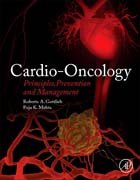
Cardio-Oncology: Principles, Prevention and Management
Gottlieb, Roberta A.
Mehta, Puja K
Cardio-Oncology: Principles, Prevention and Management is a clinical volume that combines underlying biology with clinical findings for the management of cardiac health throughout cancer treatment. The failure to recognize and manage a patient's cardiovascular health can lead to the unfortunate outcome of cancer cure at the cost of ischemic heart disease or progressive heart failure. This volume provides unique perspectives and controversial viewpoints from leaders in the field to aid in analysis and treatment. It is a valuable resource for cardiologists, oncologists, internists, and pediatricians caring for patients with cancer or cardiovascular risk factors or disease, and cardiology and cancer researchers looking to further their work. The first section is devoted to the spectrum of cardiotoxicity and cardiac physiology. The second section dives into the basic science surrounding cancer medications, cardiology medications, and their effect on the body. The third section tackles tactics for recognizing cardiotoxicity and at-risk patients, while the last two sections approach patient management from both the oncology and cardiology perspectives. Incorporates controversial views on prominent topics by pairing chapter authors with conflicting viewpoints or including a counterpoint assessment Uncovers areas of consideration that cardiologists and oncologists should consider while managing a patient with cancer and cardiovascular risk factors Includes chemotoxicity case reports which provide risk assessment guidance of current cardio-oncology patients INDICE: I) Overview 1) Spectrum of cardiotoxicity (acute, delayed, late-onset) 2) Cardiac physiology (myocytes: mitochondria, contractile elements / fibroblasts / inflammatory cells / endothelial cells and vasculature / stem cells and remodeling) 3) Cardiac physiology (function, diastolic vs systolic dysfunction, remodeling) II) Basic Science 4) Anthracyclines a) Topo II and DNA damage b) Free radicals and cellular defenses c) Stem cells 5) Kinase inhibitors a) Shared kinases in heart b) Impact on cardiomyocytes, fibroblasts, endothelial cells c) Impact on stem cells 6) VEGF inhibitors a) Endothelial function b) Vascular remodeling in the heart 7) Trastuzumab and kin a) ErbB2 receptors in the heart b) Other topics? 8) Impact of chemo on cardiac tolerance to stress 9) Impact of radiation on cardiac tolerance to stress 10) Screens for cardiotoxicity in drug development III) Recognition 11) Detection of acute and delayed cardiotoxicity 12) Early predictors of progressive cardiac dysfunction 13) Identification of at-risk patients and comorbidities that increase risk 14) Role of novel imaging modalities in detection of chemotoxicity: echo strain imaging and cardiac MRI 15) Biomarkers of acute or delayed injury 16) Impact of chemotherapy on cardiopulmonary reserve (decreased exercise capacity) IV) Proactive management 17) Cardiac risk assessment in cancer patient a) BP, diabetes, and atherosclerosis b) Lifestyle c) Role of coronary calcium, hs-CRP, ABI 18) Pharmacologic treatment (ACE-I, BB, Statins) in prevention of toxicity a) Anthracyclines b) Kinase inhibitors etc 19) Recommendations for cardiac imaging follow-up 20) Cancer rehabilitation and quality of life 21) Managing cardiovascular care in childhood cancer survivors 22) Special considerations for radiotherapy (oncology perspective) 23) Radiotherapy and cardiovascular sequelae V) Managing the patient in advanced HF 24) General and specific considerations in cancer survivors 25) Heart transplant considerations in cancer survivors
- ISBN: 978-0-12-803547-4
- Editorial: Academic Press
- Encuadernacion: Cartoné
- Páginas: 400
- Fecha Publicación: 01/10/2016
- Nº Volúmenes: 1
- Idioma: Inglés
